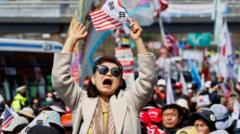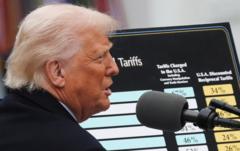The ruling lays the groundwork for upcoming elections while addressing the nation's need for stability amidst looming global concerns.
South Korea's Impeached President Yoon Suk Yeol Ousted Amidst Political Turmoil

South Korea's Impeached President Yoon Suk Yeol Ousted Amidst Political Turmoil
South Korea's Constitutional Court ends the presidency of Yoon Suk Yeol following martial law declaration, navigating through societal divisions.
South Korea’s political landscape experienced a significant upheaval on Friday as the Constitutional Court delivered a unanimous ruling to remove President Yoon Suk Yeol from office after a tumultuous period of unrest following his controversial declaration of martial law in December. This decision marks a turning point, allowing the nation to proceed with the necessary preparations for a new election amid ongoing societal divisions sparked by Yoon’s presidency.
The court's ruling followed months of protests where supporters and opponents of Yoon clashed on the streets of Seoul, signaling deep polarization within South Korea's political sphere. Yoon's actions leading up to his impeachment created a challenging scenario, forcing the nation to function without an elected leader and navigate significant foreign policy issues, including heightened military collaboration between North Korea and Russia, compounded by an unsettled global trade environment influenced by new tariffs imposed by the United States under President Donald J. Trump.
With Yoon's presidency officially concluded, he is now required to leave the Blue House, the presidential residence, as the government announces a timeline for a national election to be held within the next 60 days, marking a critical step towards restoring leadership stability. Commenting on the court’s decision, Sung Deuk Hahm, a political expert at Kyonggi University, emphasized that the ruling signifies a triumph for democracy in South Korea, reflecting a societal journey towards the rule of law achieved without bloodshed or severe violence, a stark contrast to the country’s past struggles against military authoritarianism.
As South Korea looks forward, political analysts and citizens alike await to see how this shift will impact the country’s governance and cohesion in the face of external pressures and domestic challenges.
The court's ruling followed months of protests where supporters and opponents of Yoon clashed on the streets of Seoul, signaling deep polarization within South Korea's political sphere. Yoon's actions leading up to his impeachment created a challenging scenario, forcing the nation to function without an elected leader and navigate significant foreign policy issues, including heightened military collaboration between North Korea and Russia, compounded by an unsettled global trade environment influenced by new tariffs imposed by the United States under President Donald J. Trump.
With Yoon's presidency officially concluded, he is now required to leave the Blue House, the presidential residence, as the government announces a timeline for a national election to be held within the next 60 days, marking a critical step towards restoring leadership stability. Commenting on the court’s decision, Sung Deuk Hahm, a political expert at Kyonggi University, emphasized that the ruling signifies a triumph for democracy in South Korea, reflecting a societal journey towards the rule of law achieved without bloodshed or severe violence, a stark contrast to the country’s past struggles against military authoritarianism.
As South Korea looks forward, political analysts and citizens alike await to see how this shift will impact the country’s governance and cohesion in the face of external pressures and domestic challenges.




















